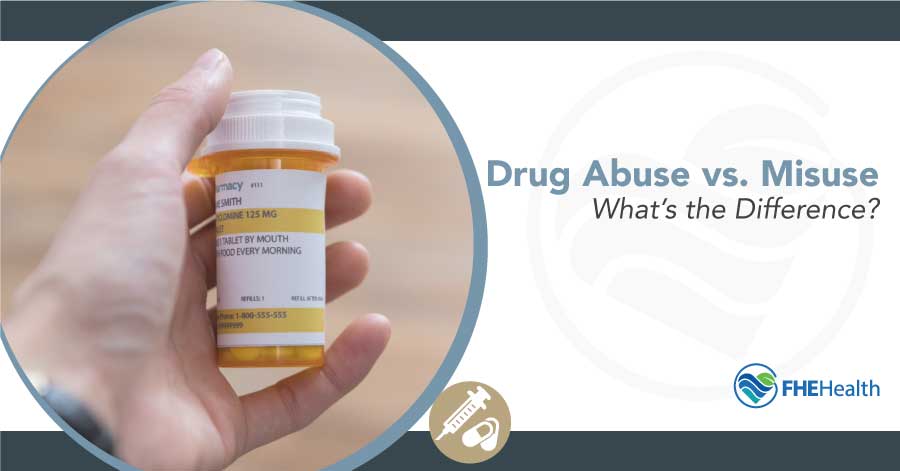
A 2023 study revealed that 59% of people aged 12 and older had used drugs in the past month. This seems like a high number, but drug abuse isn’t necessarily the same as substance use and misuse. While some people use the terms interchangeably, the drug abuse definition is clear and distinct.
Drug Misuse Definition
According to MedlinePlus, the drug misuse definition is “[taking] a medicine in a way that is different from what the doctor prescribed.” Often, this involves drugs you acquired through a legal prescription.
Consider this example: You’re prescribed a prescription painkiller for migraines. When you take the medicine, you notice that you also experience pleasant feelings of calmness and relaxation. So one day, after a fight with your spouse or a difficult day at work, you decide to take one of the pills for this effect, even though you aren’t currently experiencing a migraine. This would be classified as drug misuse. Even though you have a legal prescription and aren’t addicted to the medication, you’re still using it in a way it wasn’t prescribed for.
Another common example is people using ADHD medications like Ritalin to lose weight or increase their focus during late-night study sessions. The important thing to remember here is that while drug misuse can lead to addiction, you don’t have to be addicted to a substance to be misusing it.
Drug Abuse Definition
Alcoholics Anonymous defines alcoholism as “the combination of a physical sensitivity to alcohol and a mental obsession with drinking, which, regardless of consequences, cannot be broken by willpower alone.” Essentially, the drug abuse definition states that abuse is the point when the substance starts to take over your life.
Once you start abusing drugs on a regular basis, your body gets used to operating with those drugs in your system as its baseline normal mode. You also start to develop a tolerance, which means you need more and more of the substance to achieve the same effects. If you try to stop using the drugs, your body will go through withdrawal from your drug dependency, which can have unpleasant physical and mental side effects.
What Is the Difference Between Drug Misuse and Abuse?
While it’s not recommended, drug misuse isn’t necessarily illegal. Misuse is as simple as taking an extra pill or using your medication to treat an unrelated condition. If you don’t feel a compulsion to use the drug, you’re probably not addicted.
Drug abuse, on the other hand, involves an addiction to illegal substances, such as heroin, meth, cocaine or PCP. Signs of addiction include spending excessive amounts of money on the drug, lying to friends and relatives about your condition, abandoning personal obligations and feeling like you can’t live without the substance.
For example, taking Xanax as directed is regular use, while using prescribed Xanax to treat a headache is misuse. Illegally buying Xanax off the street and using it to feel “high” is abuse.
Why Does the Difference Between Drug Misuse and Abuse Matter?
So, why are we taking the time to make this distinction, and why does it matter? Knowing the difference between drug misuse and drug abuse is key to understanding where you are in your addiction or recognizing a problem in a loved one. It’s normal for people to downplay their substance use issues as “not that big a deal” or “not something that happens all the time.” And this may be true for someone who’s misusing instead of abusing drugs. However, this doesn’t mean there still isn’t a problem.
Any time you’re taking medications or using a substance in a way other than it’s intended to be used, it can have serious effects on your physical, mental and emotional health. Left unchecked, a substance misuse issue can spiral and become an out-of-control addiction that can affect every area of your life, from your job and your daily activities to your relationships with friends and family. Being able to distinguish between substance use, substance misuse, and substance abuse is the first step in accurately assessing your issue and figuring out your next steps.
Getting Help for Misusing or Abusing Drugs
At FHE Health, our experienced staff can help you understand whether you’re misusing drugs, abusing drugs or dealing with a full-blown addiction. We know that admitting there’s a problem is difficult, but once you’ve done just that, you can start moving toward a better, healthier and sober lifestyle. Contact us today to find out more about the programs we offer.






